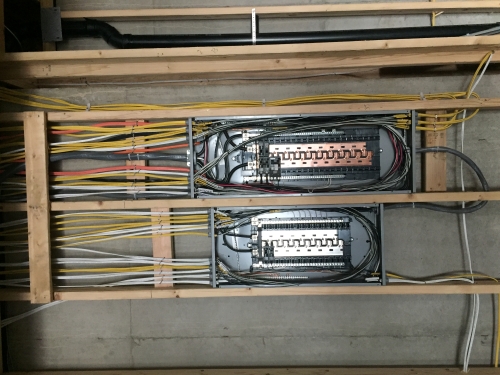Electrician in North half of Denver metro area, CO
Comprehensive electrical services for the north Denver metro area, covering homes, bungalows to modern buildings, with a focus on safety, reliability, and code compliance. The page outlines common issues such as circuit-tripping, flickering lights, aging panels, and outdated wiring, and explains diagnostic steps, from initial assessment to testing and documentation. It describes licensing standards, safety practices, and preventive maintenance tips, along with scheduling, permits, and warranty expectations for residential and light-commercial projects, including EV charging and smart-home upgrades.

Electrician in North half of Denver metro area, CO
Keeping your home or small business safe and powered reliably is essential in the north half of the Denver metro area. From older Denver-era bungalows to modern suburban builds in Thornton, Broomfield, and Westminster, electrical systems face a unique mix of high-elevation sun, freeze-thaw cycles, heavy summer storms, and growing demand from EV chargers and smart-home upgrades. This page explains the full range of residential and light-commercial electrical services available locally, common problems homeowners and businesses encounter, how technicians diagnose and fix issues, safety and code considerations, and practical maintenance tips to protect your property and family.
Common electrical issues in the north Denver metro area
Residents and light-commercial properties in this region typically call for help with:
- Frequent circuit breaker trips or blown fuses
- Flickering or dimming lights, especially during HVAC or appliance startup
- Dead or intermittent outlets and switches
- Aging panels, rusted components, or full panels that need an upgrade
- Outdated wiring types (evidence of aluminum, cloth-insulated, or knob-and-tube wiring)
- Outdoor or garage outlet failures after winter freezes or summer storms
- Surge damage to electronics after lightning or grid events
- Need for code-compliance inspections before remodels or real estate transactions
These issues can cause inconvenience, increase fire risk, or lead to code violations that block permits or sales. Local weather extremes and older housing stock make routine inspection and timely repairs especially important here.
Services offered (residential and light-commercial)
Electricians serving the north half of the Denver metro area typically provide a full portfolio of services, including:
- Troubleshooting and electrical diagnosis for intermittent faults, breaker trips, and shorts
- Lighting and fixture installation: recessed lighting, chandeliers, track lighting, landscape and exterior lighting
- Outlet and switch work: standard, GFCI, and weather-rated outdoor outlets; USB outlets; dimmers and smart switches
- Panel upgrades and service changes: converting from outdated panels, increasing capacity for EV chargers or HVAC
- New construction and remodel wiring: coordinated work with builders and inspectors for kitchens, basements, and additions
- Code-compliance inspections and corrective work: pre-sale inspections, permit-ready repairs, and safety remediation
- Light-commercial wiring: small retail, office, and tenant-space electrical systems, including emergency lighting and tenant fit-outs
- Surge protection and whole-home safety solutions for electronics and sensitive equipment
- Generator and transfer switch wiring for backup power needs
Diagnostic and repair process — what to expect
A professional approach to diagnosis and repair typically follows these steps:
- Initial assessment: technician listens to the problem, reviews visible signs, and asks about the history and patterns of the fault.
- Safety check: verify wiring condition, grounding, and any immediate hazards such as burnt connections or tripped breakers.
- Targeted testing: use of multimeters, circuit tracers, and insulation testers to isolate faults without unnecessary demolition.
- Written findings: clear explanation of issues, recommended repairs or upgrades, and code implications.
- Scope and execution: prioritized work that restores safety and functionality—replacing components, repairing conductors, or upgrading panels.
- Verification and testing: confirm repairs with load tests, GFCI/AFCI function checks, and proper labeling.
- Documentation for inspections: provide enough detail to support permit sign off and future resale disclosures.
Technicians often leave work areas clean and provide simple user instructions for any new equipment.
Technician qualifications and safety practices
Qualified electricians servicing the Denver north metro area typically hold current state licenses, carry continuing education in the National Electrical Code updates, and follow industry best practices:
- Licensed journeyman or master electricians for permitted work
- Proper use of personal protective equipment and lockout/tagout procedures
- Documentation and permits for work that changes service or panel equipment
- Testing for proper grounding and bonding, and installation of GFCI and AFCI devices where code requires
- Safe handling of older wiring types and clear communication when a partial repair is a temporary measure
These practices reduce risk and ensure work meets local jurisdiction requirements across Adams, Broomfield, and northern Denver neighborhoods.
Code compliance, permits, and inspections
Electrical work that affects service size, alters branch circuits, or installs new equipment typically requires permits and inspections. In the north Denver metro area, local jurisdictions enforce the Colorado-adopted codes and municipal amendments. A qualified electrician will:
- Identify permit triggers before starting work
- Pull the necessary permits and schedule inspections or advise on municipality expectations
- Make code-oriented upgrades such as GFCI/AFCI installations, grounding improvements, and panel labeling
- Provide documentation and invoices suitable for insurance or real estate needs
Proper permitting protects property value and reduces liability.
Scheduling, service area logistics, and typical timing
Because weather windows and building seasons affect availability, electricians in this area often offer flexible scheduling for routine maintenance, weekend remodel work, and emergency response after storms. Typical job durations:
- Troubleshooting and simple repairs: a few hours
- Fixture and outlet installations: 1 to 4 hours
- Panel upgrades or service changes: 1 to 2 days, depending on permitting and utility coordination
- Remodel or new-construction wiring: scheduled phases aligned with other trades
For businesses, scheduling can be coordinated outside peak hours to minimize downtime.
Preventive maintenance and homeowner tips
Take action to avoid urgent failures and extend system life:
- Test GFCI and AFCI devices monthly and replace any outlets that do not reset
- Inspect outdoor outlets and lighting after winter storms and spring thaw
- Have panels inspected if you experience frequent trips, burning smells, or visible corrosion
- Consolidate heavy loads on dedicated circuits for EV chargers, HVAC, or workshop equipment
- Consider whole-home surge protection to guard electronics from lightning and utility switching
- Plan upgrades before adding major appliances or EV chargers to avoid emergency panel work
Guarantees and long-term value
Quality electrical work in the north half of Denver metro area should come with clear workmanship assurances and compliance guarantees. Proper repairs and upgrades reduce fire risk, can lower insurance exposure, and preserve property value. Investing in code-compliant work now avoids costly emergency fixes later and supports safe, efficient operation of modern loads like EVs and smart-home systems.
Solid diagnostic work, licensed technicians, and adherence to local codes make the difference between a temporary fix and a long-term solution for your home or light-commercial property in the north Denver metro area.

















